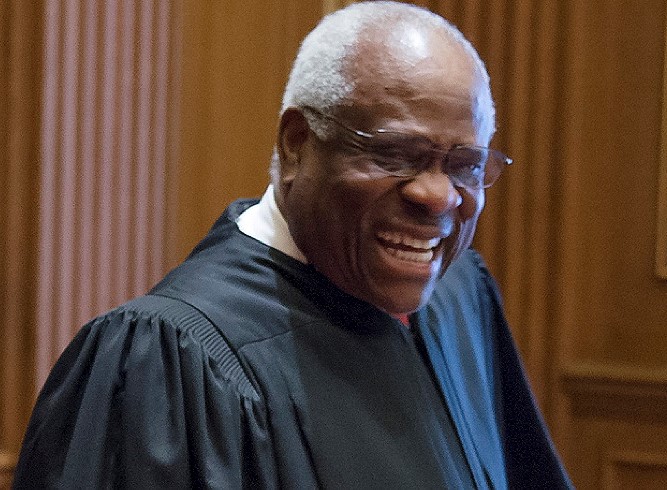Posted on June 28,
2023
Let's Get Ethical
Screening the Supreme Court for
corruption
by
Daniel
Clark
Since last year's Dobbs decision overturning Roe
v. Wade, the Democrats and therefore the news media have developed ethical
concerns about the Supreme Court that they had mysteriously never considered
before. All of a sudden, the justices,
or at least the conservative ones, have come under fire for their personal
friendships, financial transactions, and all sorts of things that had never
been at issue before.
It would make things a whole lot simpler if the
self-appointed judicial ethics police would take a look at the other end of the
alleged transgressions. If a Supreme
Court justice is corrupt, then the result  must
be in the form of opinions that have been corrupted, which is to say, those
that are unfaithful to the Constitution.
After all, nobody needs to bribe the justices to hand down
constitutionally correct rulings. That's
what they're supposed to do anyway.
Therefore, if Clarence Thomas, who has borne the brunt of the scrutiny,
were conducting himself in an unethical manner, then his detractors ought to be
able to demonstrate his many offenses against the Constitution. If, on the other hand, he has consistently,
correctly interpreted the law, as they know he has, then they must conclude
that he has not been compromised.
must
be in the form of opinions that have been corrupted, which is to say, those
that are unfaithful to the Constitution.
After all, nobody needs to bribe the justices to hand down
constitutionally correct rulings. That's
what they're supposed to do anyway.
Therefore, if Clarence Thomas, who has borne the brunt of the scrutiny,
were conducting himself in an unethical manner, then his detractors ought to be
able to demonstrate his many offenses against the Constitution. If, on the other hand, he has consistently,
correctly interpreted the law, as they know he has, then they must conclude
that he has not been compromised.
Therefore, in order to spare those hardworking
Democrat opposition researchers a lot of time and effort, here is a convenient
guide that a Supreme Court justice may use to determine, based on the
results, whether he or she is corrupt:
* If, when judicial precedent conflicts with the
actual language of the Constitution, you side with precedent;
* If you subscribe to the "living Constitution"
paradigm, by which you assume that the Constitution spontaneously amends itself
at your convenience;
* If you argue that the precedents you prefer must be
granted absolute permanency in accordance with stare decisis, while also
maintaining that they are based on a Constitution that is constantly evolving;
* If you've read the independent clause, "the right of
the people to keep and bear arms shall not be infringed," and expressed
uncertainty about what in the world that could possibly mean;
* If you believe a constitutional right may be
overridden just as long as a state government argues that it has a "compelling
interest" in doing so;
* If you creatively paraphrase clauses from the
Constitution in order to expand them to mean things they don't, such as the
morphing of "public use" into "public purpose" in the Kelo v. New London
eminent domain case, which was done to justify a forcible transfer of property
on the basis that the new owners would pay more in property taxes;
* If you claim to have found a "fundamental
constitutional right" in a "penumbra," or shadowy area of the Constitution;
* If you profess to believe in the concept of
"incorporation," by which a constitutional provision that is only specified to
apply to Congress is presumed to extend to all levels of government right down
to public schools, even though the Constitution goes out of its way not to say
so;
* If you have interpreted the power of Congress to
regulate interstate "commerce" -- meaning the large-scale trading of commodities
-- in such a way as to grant the federal government control over any activity
that might result in a dollar changing hands;
* If you interpret the word "speech" to encompass,
among other things, the act of setting fire to something;
* If you read the Eighth Amendment as if it prohibits
punishments that are merely cruel or unusual instead of both cruel and
unusual, because you imagine that our founders were concerned about the
well-being of criminals, instead of equal justice under the law;
* If, in the dissenting opinion from the Dobbs
ruling that overturned Roe v. Wade, you justified the fabrication of a
phony constitutional right by denouncing those who wrote and ratified the
Constitution as sexists;
* If you agree with the majority opinion in Roe v.
Wade that it is not necessary to determine when life begins in order to
declare a right to kill millions of creatures that, by your own admission,
might be people;
then, you are guilty.
Supreme Court justices are required to take an oath to
support and defend the Constitution of the United States, and specifically to
take this obligation without any purpose of evasion. The examples listed above are evasions. If liberals were really determined to hold
the justices accountable for unethical behavior, which they assuredly are not,
they would start here.
The Shinbone: The Frontier of the Free Press
Mailbag . Issue Index . Politimals . College Football Czar